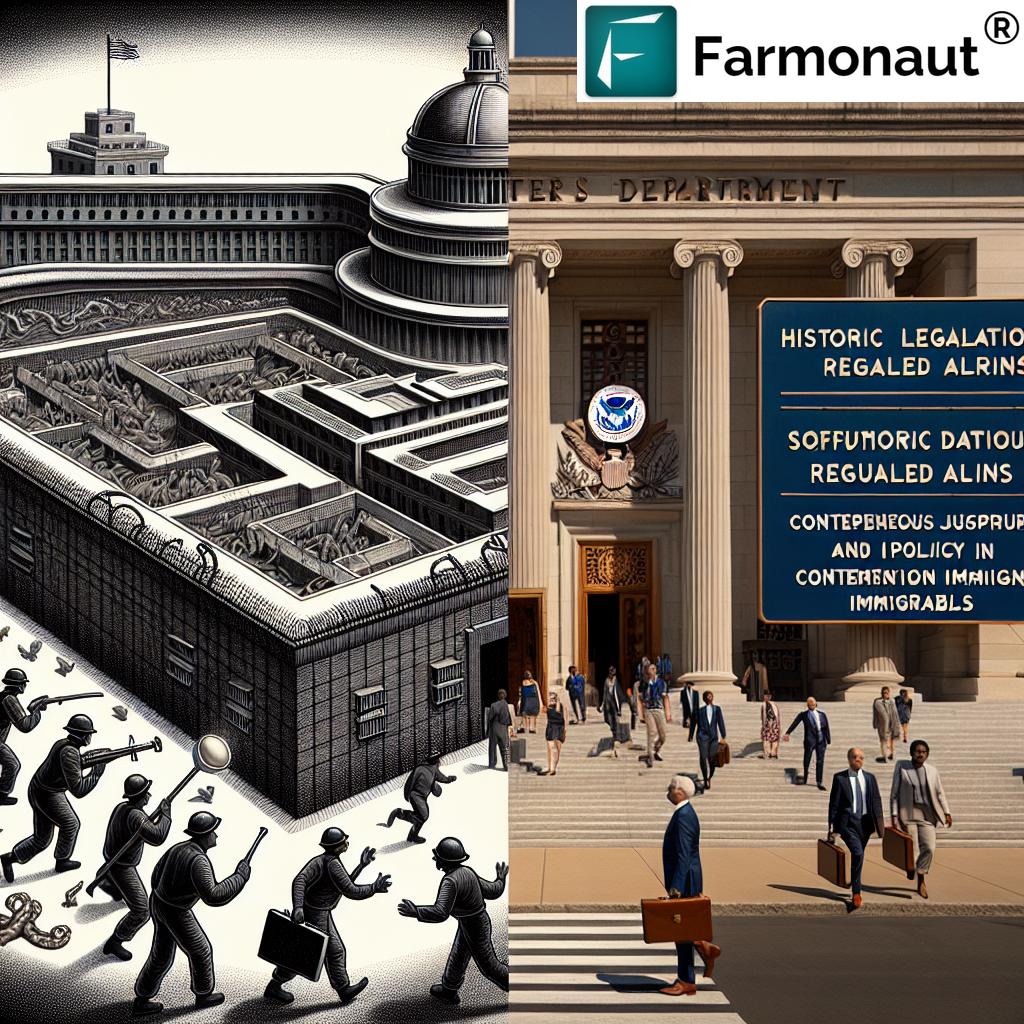Breaking: US Court Challenges Controversial Deportation Policy Amid International Tensions
“The Alien Enemies Act, used in recent US deportation policy, dates back to World War II Japanese internment camps, over 75 years ago.”
In a startling turn of events, we find ourselves at the epicenter of a complex and contentious issue that has sent shockwaves through the United States government and beyond. The recent federal court ruling challenging the Trump administration’s controversial deportation policy has ignited a firestorm of debate, bringing to light the delicate balance between national security, international relations, and human rights.
As we delve into this multifaceted topic, we’ll explore the intricate web of legal, political, and diplomatic implications that have arisen from this unprecedented situation. Our analysis will shed light on the use of the Alien Enemies Act, a law with roots in one of the darkest chapters of American history, and its application in modern immigration enforcement.

The Unfolding Drama: A Timeline of Events
To better understand the sequence of events that led to this crisis, let’s examine a timeline of key developments:
| Date | Event | Significance |
|---|---|---|
| Early 2023 | Implementation of new deportation policy | Trump administration expands use of Alien Enemies Act for rapid deportations |
| Late 2023 | Mass deportation of Venezuelan migrants | Over 200 individuals deported to El Salvador, sparking international concern |
| January 2024 | Federal court ruling on Venezuelan migrant deportation | Judge Boasberg blocks use of Alien Enemies Act, orders return of deported individuals |
| January 2024 | White House response to court order | Administration argues it can ignore judge’s ruling, citing national security concerns |
| February 2024 | State Department actions | Secretary Rubio publicly thanks El Salvador for assistance, escalating diplomatic tensions |
| March 2024 | International reactions | Venezuelan government condemns actions, UN expresses concern over human rights violations |
This timeline illustrates the rapid escalation of events and the complex interplay between domestic law enforcement, foreign policy, and international relations. As we can see, what began as a domestic policy decision quickly spiraled into a global issue, drawing in multiple countries and international organizations.
The Alien Enemies Act: A Controversial Tool from the Past
At the heart of this controversy lies the Alien Enemies Act, a law that has its roots in one of the most controversial periods of American history. Originally enacted in 1798, the Act gained notoriety during World War II when it was used to justify the internment of Japanese Americans.
The Trump administration’s decision to revive this long-dormant law for modern immigration enforcement has raised serious questions about the appropriateness and legality of such actions in the 21st century. Critics argue that the use of wartime powers in peacetime sets a dangerous precedent and potentially violates international human rights standards.
While the above video discusses satellite data interpretation for agriculture, it’s worth noting how technology and data analysis play crucial roles in modern governance and policy implementation, including in areas like immigration and border control.
The Federal Court Ruling: A Challenge to Executive Power
The recent ruling by U.S. District Judge James Boasberg marks a significant challenge to the executive branch’s authority in matters of immigration and national security. By blocking the use of the Alien Enemies Act and ordering the return of deported individuals, the court has effectively thrown a wrench into the administration’s deportation strategy.
Judge Boasberg’s decision hinges on the interpretation of “hostile acts” as defined in the statute. The court argues that the law refers to actions by foreign nations that are “commensurate to war,” setting a high bar for its application in peacetime immigration enforcement.
“The recent US court ruling on deportation affects Venezuelan migrants to El Salvador, involving at least 3 countries in this complex issue.”
White House Response: Defiance or Legal Interpretation?
The White House’s response to the court order has been both swift and controversial. While claiming not to defy the court outright, the administration has argued that it has the right to ignore the judge’s ruling. This stance has raised serious questions about the separation of powers and the limits of executive authority.
White House Press Secretary Karoline Leavitt’s statement that “A single judge in a single city cannot direct the movements of an aircraft carrier full of foreign alien terrorists who were physically expelled from U.S. soil” has been met with both support and criticism. Supporters view it as a necessary assertion of executive power in matters of national security, while critics see it as a dangerous overreach that threatens the checks and balances system.

The El Salvador Connection: A New Player in the Drama
The involvement of El Salvador in this unfolding drama adds another layer of complexity to an already intricate situation. The decision to deport Venezuelan migrants to El Salvador, rather than their country of origin, has raised eyebrows and questions about the motivations behind this choice.
El Salvador’s President Nayib Bukele’s public response, including his social media post with a laughing emoji, has further stoked tensions. The transfer of the deported individuals to the Terrorism Confinement Center, a mega-prison capable of holding up to 40,000 inmates, has drawn criticism from human rights organizations and raised concerns about the treatment of these migrants.
While this video showcases Farmonaut’s achievements in the agricultural sector, it’s important to consider how technological advancements and data-driven decision-making can impact various aspects of governance, including immigration policies and international relations.
International Reactions and Diplomatic Fallout
The international community has not remained silent on this issue. Venezuela, the home country of the deported migrants, has strongly condemned the actions of both the United States and El Salvador. The United Nations has expressed concern over potential human rights violations, calling for transparency and adherence to international law.
Other Latin American countries have also weighed in, with some expressing solidarity with Venezuela and others supporting the U.S. stance on combating transnational crime. This situation has the potential to reshape diplomatic relationships across the Americas and beyond.
Legal Challenges and Human Rights Concerns
The American Civil Liberties Union (ACLU) has been at the forefront of challenging the administration’s use of the Alien Enemies Act. Lead attorney Lee Gelernt has called for the government to ensure that no migrants were removed in violation of the court order and to work with foreign governments to repatriate any individuals who may have been wrongfully deported.
Human rights organizations have raised concerns about the treatment of the deported individuals, particularly given their transfer to a high-security prison in El Salvador. Questions about due process, access to legal representation, and the potential for human rights abuses loom large over this situation.
The Role of Technology in Modern Immigration Enforcement
While discussing these complex legal and diplomatic issues, it’s worth noting the increasing role of technology in modern governance and policy implementation. Companies like Farmonaut are at the forefront of leveraging satellite technology and artificial intelligence for agricultural purposes. Similar technologies are increasingly being applied in border control and immigration enforcement.
For instance, satellite imagery and AI-powered analytics are being used to monitor border areas and track migration patterns. While these tools can enhance efficiency and security, they also raise important questions about privacy and the ethical use of technology in sensitive areas like immigration enforcement.
This video introduces Farmonaut’s large-scale usage for businesses and governments, highlighting the potential of technology in addressing complex challenges across various sectors, including governance and policy implementation.
The Balance of Power: Executive, Judicial, and Legislative Branches
This case has brought to the forefront the delicate balance of power between the three branches of the U.S. government. The executive branch’s assertion of authority in immigration matters, the judicial branch’s intervention through the federal court ruling, and the potential for legislative action in response to this crisis all highlight the complex system of checks and balances at play.
As this situation continues to unfold, we may see further involvement from Congress, either through hearings, investigations, or potential legislation aimed at clarifying the use of laws like the Alien Enemies Act in modern contexts.
Implications for US Foreign Policy and National Security
The deportation controversy has significant implications for U.S. foreign policy, particularly in Latin America. The decision to involve El Salvador in the deportation of Venezuelan nationals adds a new dimension to regional dynamics and could potentially reshape alliances and cooperation in areas such as counterterrorism and transnational crime fighting.
From a national security perspective, the administration’s actions raise questions about the balance between addressing legitimate security concerns and respecting international law and human rights norms. The use of wartime powers in peacetime immigration enforcement sets a precedent that could have far-reaching consequences for future administrations and U.S. standing on the global stage.
This video discusses the role of artificial intelligence in agriculture, demonstrating how cutting-edge technologies can be applied to solve complex problems. Similar innovations are increasingly relevant in areas of governance, including immigration and border control.
The Road Ahead: Potential Outcomes and Long-term Consequences
As we look to the future, several potential outcomes and long-term consequences of this crisis come into focus:
- Legal Precedent: The resolution of this case could set important legal precedents regarding the use of wartime powers in immigration enforcement and the limits of executive authority.
- Diplomatic Relationships: The handling of this situation may have lasting effects on U.S. relationships with Venezuela, El Salvador, and other Latin American countries.
- Human Rights Impact: The treatment of the deported individuals and the resolution of their cases will be closely watched by human rights organizations and could influence future immigration policies.
- Legislative Action: Congress may be spurred to act, potentially revising or clarifying laws related to immigration enforcement and the use of emergency powers.
- Public Opinion: The controversy may shape public perception of immigration issues and influence future electoral politics.
Conclusion: A Test for Democracy and International Relations
The unfolding deportation controversy represents a significant test for American democracy, the rule of law, and the country’s standing in international relations. As the situation continues to develop, it will require careful navigation of complex legal, diplomatic, and ethical considerations.
The resolution of this crisis will likely have far-reaching implications, not only for U.S. immigration policy but also for the balance of power within the government and America’s role on the global stage. As we move forward, it is crucial to maintain a commitment to democratic principles, human rights, and the rule of law while addressing legitimate national security concerns.
In an era of rapid technological advancement and global interconnectedness, the tools and strategies used to address these challenges will continue to evolve. Companies like Farmonaut, while focused on agricultural solutions, exemplify the potential for innovative technologies to address complex global issues. As we grapple with the intricacies of modern governance and international relations, such technological advancements may offer new approaches to long-standing challenges.
Ultimately, the resolution of this deportation controversy will serve as a defining moment in U.S. history, shaping the country’s approach to immigration, executive power, and international cooperation for years to come.
FAQs
- What is the Alien Enemies Act?
The Alien Enemies Act is a law dating back to 1798 that gives the U.S. president broad powers to detain or deport citizens of hostile nations during wartime. It gained notoriety for its use in interning Japanese Americans during World War II. - Why is the deportation of Venezuelan migrants to El Salvador controversial?
The deportation is controversial because it involves sending migrants to a third country rather than their country of origin, raising questions about the legality and ethics of such actions under international law. - What was the federal court’s ruling on the deportation policy?
U.S. District Judge James Boasberg blocked the use of the Alien Enemies Act for deportations and ordered the return of deported individuals, arguing that the law’s provisions for “hostile acts” refer to actions “commensurate to war.” - How has the White House responded to the court order?
The White House has argued that it has the right to ignore the judge’s ruling, citing national security concerns and asserting that a single judge cannot dictate actions related to “foreign alien terrorists.” - What are the potential international consequences of this controversy?
The controversy could strain diplomatic relationships with Venezuela and El Salvador, impact regional cooperation on issues like counterterrorism, and potentially influence U.S. standing in international human rights discussions.
Earn With Farmonaut: Affiliate Program
Earn 20% recurring commission with Farmonaut’s affiliate program by sharing your promo code and helping farmers save 10%. Onboard 10 Elite farmers monthly to earn a minimum of $148,000 annually—start now and grow your income!
For more information on Farmonaut’s satellite and weather API, visit our API page or check out our API Developer Docs.







